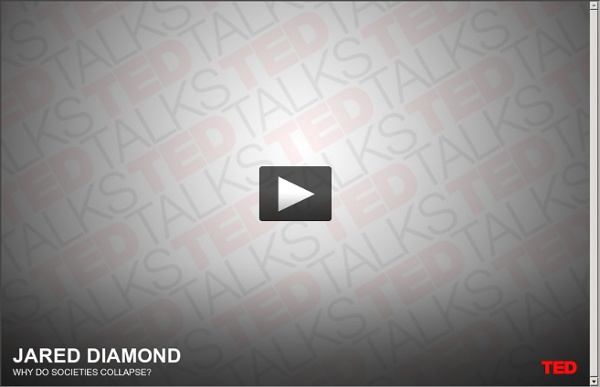



http://www.ted.com/talks/jared_diamond_on_why_societies_collapse.html
Related: Inner SearchThe Battle for Your Mind: Brainwashing Techniques Being Used On The Public By Dick Sutphen Authoritarian followers Mind Control Subliminals By Dick Sutphen Summary of Contents The Birth of Conversion The Three Brain Phases How Revivalist Preachers Work Voice Roll Technique Six Conversion Techniques 1. keeping agreements 2.physical and mental fatigue 3. increase the tension 4. Cooperative In short, a coop can be defined as "a jointly owned enterprise engaging in the production or distribution of goods or the supplying of services, operated by its members for their mutual benefit, typically organized by consumers or farmers."[4] Cooperative businesses are typically more economically resilient than many other forms of enterprise, with twice the number of co-operatives (80%) surviving their first five years compared with other business ownership models (41%).[5] Cooperatives frequently have social goals which they aim to accomplish by investing a proportion of trading profits back into their communities. As an example of this, in 2013, retail co-operatives in the UK invested 6.9% of their pre-tax profits in the communities in which they trade as compared with 2.4% for other rival supermarkets.[6] The International Co-operative Alliance was the first international association formed by the cooperative movement. It includes the World Council of Credit Unions.
Self-organization Self-organization occurs in a variety of physical, chemical, biological, robotic, social and cognitive systems. Common examples include crystallization, the emergence of convection patterns in a liquid heated from below, chemical oscillators, swarming in groups of animals, and the way neural networks learn to recognize complex patterns. Overview[edit] The most robust and unambiguous examples[1] of self-organizing systems are from the physics of non-equilibrium processes. Self-organization is also relevant in chemistry, where it has often been taken as being synonymous with self-assembly.
Five Manifestos for the Creative Life by Kirstin Butler How a numbered list can start a personal revolution. Some days everyone needs a little extra encouragement. The words or lines or colors don’t want to come, or worse, we don’t even want to sit down to create. That’s when we turn to these inspiring manifestos, any one of which is guaranteed to give our uncooperative creativity a sharp kick in the pants.
101 Timeless Lessons Life Teaches post written by: Angel Chernoff Email Take everything you’ve ever learned – all the crazy experiences and lessons – and place it all in a box labeled “Thank you.” What has life taught you? Think about all the things you would love to tell yourself if you could travel back in time to give your younger self some advice about life. Critical Thinking Worksite: Introduction I. Just What is Critical Thinking? When you hear "critical thinking", it is natural to think of criticism---that is, of unpleasant episodes involving your parents or your boss. Letting Go of Attachment “Most of our troubles are due to our passionate desire for and attachment to things that we misapprehend as enduring entities.” ~Dalai Lama Editor’s note: This is a guest post from Lori Deschene of Tiny Buddha. If there’s one thing we all have in common it’s that we want to feel happy; and on the other side of that coin, we want to avoid hurting.
5-Step Action Guide to Shine Your Light in 2010 5-Step Action Guide to Shine Your Light in 2010 Have you ever wondered why it seems so easy for some people to make major changes in their life while others sit back as passive observers wondering what happened? They begin to wonder where their life went wrong. They say things such as, “Why are bad things always happening to me?”